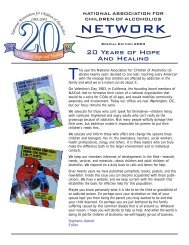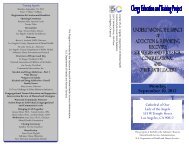Contents - NACoA
Contents - NACoA
Contents - NACoA
Create successful ePaper yourself
Turn your PDF publications into a flip-book with our unique Google optimized e-Paper software.
concern. Furthermore, if care is taken to avoid communicating that the child’s difficulties<br />
are related to his or her parent’s alcoholism, and if you direct attention to the child’s<br />
program and social performance, the parent is very likely to welcome your help.<br />
Since you do not diagnose alcoholism or problem drinking, it is unlikely that alcoholism<br />
will be a part of the discussion when you are talking to parents. Denial of<br />
drinking-related problems is essential to those alcoholic parents who want to continue<br />
drinking. The spouse of an alcoholic may also feel the need to refrain from talking<br />
about drinking-related difficulties. If the topic comes up, it may be best for you to<br />
remain silent on the subject of the parent’s drinking, and concentrate on steps to<br />
help the child cope.<br />
Perhaps your greatest contribution will be in the area of helping children to<br />
discover that their feelings are normal and that it is permissible to be confused<br />
and sometimes upset about one’s home environment. Exploring a child’s feelings<br />
with him or her can help you to obtain a better understanding of the child. More<br />
importantly, an exploration of feelings may allow the child to grow in self understanding.<br />
Encourage children to develop friendships and good social skills.<br />
Some children of alcoholics have difficulty relating to their peers and adults.<br />
Like all children, they need opportunities to participate in primary group activities.<br />
However, many children of alcoholics need help to do so. Early childhood<br />
professionals who lead extracurricular and community-based activities have many<br />
opportunities to assist in fostering quality relationships for boys and girls who<br />
have alcoholic parents. Like others, these children can acquire many benefits from<br />
after-school activities. However, for children of alcoholics, the more obvious benefits<br />
of after-school activities may be secondary to the benefits achieved through<br />
the friendships developed in the program. A child not only learns how to take part<br />
in a sport, publish a newspaper, etc., but also gains a sense of belonging and a role<br />
that he or she values.<br />
Children of alcoholics may take on adult roles and responsibilities in their<br />
families—such as caring for younger children or managing housework—and therefore<br />
they can benefit from situations where there is an adult in<br />
charge. They may also benefit when an adult is supervising<br />
their younger siblings.<br />
You can play a vital role in assisting these<br />
children by getting them involved in other activities.<br />
However, getting children of alcoholics to participate<br />
in group activities may be difficult. Many such<br />
children are not eager to join activity groups. This<br />
is particularly true if they feel that an after-school





